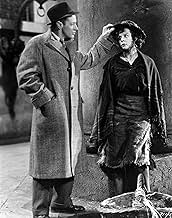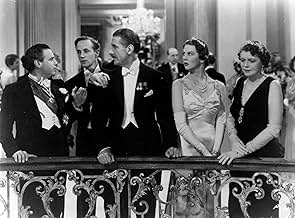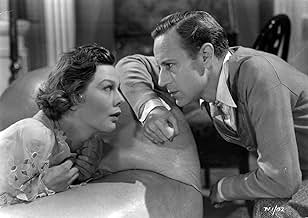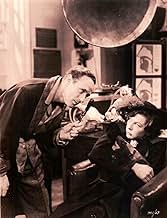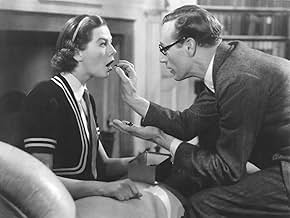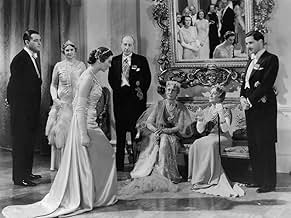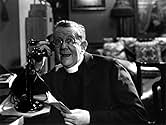AVALIAÇÃO DA IMDb
7,7/10
10 mil
SUA AVALIAÇÃO
Adicionar um enredo no seu idiomaA phonetics and diction expert makes a bet that he can teach a cockney flower girl to speak proper English and pass as a lady in high society.A phonetics and diction expert makes a bet that he can teach a cockney flower girl to speak proper English and pass as a lady in high society.A phonetics and diction expert makes a bet that he can teach a cockney flower girl to speak proper English and pass as a lady in high society.
- Direção
- Roteiristas
- Artistas
- Ganhou 1 Oscar
- 4 vitórias e 5 indicações no total
Leueen MacGrath
- Clara Eynsford Hill
- (as Leueen Macgrath)
Irene Browne
- Duchess
- (as Irene Brown)
Cathleen Nesbitt
- A Lady
- (as Kathleen Nesbitt)
Avaliações em destaque
10ted puff
Perfect cinema. That was my reaction when I first saw Pygmalion, the first of 50 viewings and counting, and I still think so. Who could not fall in love with Leslie Howard, one of our greatest actors, so tragically assassinated in the Second World War? Wendy Hiller IS Eliza. The cast is flawless. The script... words fail me, for George Bernard Shaw was a genius, he did not simply adapt his play for the screen, it is so good that it is like it's happening before your eyes. My God, after seeing this is there anyone out there who thinks 'My Fair Lady', the slowest film musical on record, is the best screen version of Shaw? If they do, they are mad.
That film moves me not one jot, everything is so clean, so smug, so unreal. Here we see poverty, but also hope. These are not actors and actresses moving through the sets garbed in Cecil Beaton, but real people, real suffering, but humanity lights every scene like a beacon. The unbearably moving scenes of Eliza capturing society at the ball, the irresistible waltz, watch this with no tears in your eyes, I dare you. Halliwells Film Guide calls this 'one of the most heartening and adult British films of the thirties'. Too right. I cannot fault this film, it is priceless. By the way, I saw 'My Fair Lady' on stage recently, and it's miles better than the film version. Warner Bros really let Shaw down, and it's impossible to put it right. But this...well it is a big compensation. And I don't miss the songs one little bit.
There are so many classic scenes I can't pick any out. Of course viewers will spot that it was 'updated' to 1938, and the original play set in the Edwardians. That doesn't hurt it at all, 'polite' society didn't change much in the intervening years and gives the play an added 'contemporary' edge. Please, please, please see this film. You will be gripped.
That film moves me not one jot, everything is so clean, so smug, so unreal. Here we see poverty, but also hope. These are not actors and actresses moving through the sets garbed in Cecil Beaton, but real people, real suffering, but humanity lights every scene like a beacon. The unbearably moving scenes of Eliza capturing society at the ball, the irresistible waltz, watch this with no tears in your eyes, I dare you. Halliwells Film Guide calls this 'one of the most heartening and adult British films of the thirties'. Too right. I cannot fault this film, it is priceless. By the way, I saw 'My Fair Lady' on stage recently, and it's miles better than the film version. Warner Bros really let Shaw down, and it's impossible to put it right. But this...well it is a big compensation. And I don't miss the songs one little bit.
There are so many classic scenes I can't pick any out. Of course viewers will spot that it was 'updated' to 1938, and the original play set in the Edwardians. That doesn't hurt it at all, 'polite' society didn't change much in the intervening years and gives the play an added 'contemporary' edge. Please, please, please see this film. You will be gripped.
This remains the definitive film version of the Shavian classic. As in any of Shaw's plays, the essence of Pygmalion rests upon sharp dialogue rather than splashy musical numbers, and upon character rather than action.
Wendy Hiller makes an infinitely better Eliza Dolittle than the miscast Audry Hepburn. Hiller's transformation from flower-girl to lady is astonishing. On the other hand, one never believes Hepburn in the role of a "draggle-tailed gutter-snipe". She comes off like a dressed-down fashion model putting on an accent.
Leslie Howard's performance is far more subtle, and far less strident, then Rex Harrison's. Perhaps Howard would have been offered the lead role in My Fair Lady in preference to Rex Harrison had he lived longer (he was shot down in a plane in 1943). The two actors were not that much different in age and, if Leslie Howard was not noted as a singer, neither was Rex Harrison.
Wendy Hiller makes an infinitely better Eliza Dolittle than the miscast Audry Hepburn. Hiller's transformation from flower-girl to lady is astonishing. On the other hand, one never believes Hepburn in the role of a "draggle-tailed gutter-snipe". She comes off like a dressed-down fashion model putting on an accent.
Leslie Howard's performance is far more subtle, and far less strident, then Rex Harrison's. Perhaps Howard would have been offered the lead role in My Fair Lady in preference to Rex Harrison had he lived longer (he was shot down in a plane in 1943). The two actors were not that much different in age and, if Leslie Howard was not noted as a singer, neither was Rex Harrison.
Shaw's brilliant play is expertly filmed by Howard and Asquith. Howard is perfectly cast as the snobbish Professor Higgins and is matched by Hiller, in her second film, as Eliza Doolittle. The fine supporting cast includes Sunderland, Lawson, and Lohr, who's terrific as Mrs. Higgins. It is difficult to make a bad film of this work, given Shaw's witty dialog, but film performance is different from stage performance, with film calling for more subtlety. The love-hate relationship between the professor and Eliza works wonderfully because Howard and Hiller provide the right combination of humor and humanity. Howard's role here is in sharp contrast to the wimpy Ashley the following year in "Gone with the Wind."
Even if I had not yet seen this film I'd have had good reason to assume its merit simply because George Bernard Shaw, as cantankerous and protective of his work as he was, liked it. But I have seen it, many times, and that only validates that conclusion.
Leslie Howard not only starred in it but co-directed as well, and accomplished both magnificently. His rapid-fire intensity, conveying the true overbearing Higgins using Eliza as if she were "a block of wood," to quote, to be sawed, hewn, nailed, drilled and pounded into an object to his liking, is wonderfully complemented by Wendy Hiller's Eliza, bringing us to understand the full range of her growth from the depths of her imprisonment in the class of the street vendor barely escaping mendacity by selling flowers to a real princess, not by royal birth, but by her strength and accomplishment. Higgins may like to claim credit for her transformation; but it's Eliza who really made it happen.
There's a lot said here comparing Pygmalion to My Fair Lady. That's really a classic apples-and-oranges fallacy. Musical theatre is an entirely different art form, with a different goal. It's clear that if this interpretation of Pygmalion had been duplicated with songs and dances tacked on, it would have been horrible; yet My Fair Lady is a triumph of its art. It's often called a musical adaptation. That's mistaken; it's "based on" Pygmalion. The nature of musical theatre requires a different approach. To evaluate either by the standards of the other is a waste of time and thought.
Shaw would undoubtedly have hated MFL; his revulsion for Romanticism and the failure of The Chocolate Soldier, the operetta based on Arms and the Man, would guarantee that. MFL is not a musical Pygmalion, and should never be mistaken for one.
It is a great tribute to the genius of George Bernard Shaw and his best-known play that it could spawn both this artful and powerful movie version and a greatly different and beautiful musical as well.
Leslie Howard not only starred in it but co-directed as well, and accomplished both magnificently. His rapid-fire intensity, conveying the true overbearing Higgins using Eliza as if she were "a block of wood," to quote, to be sawed, hewn, nailed, drilled and pounded into an object to his liking, is wonderfully complemented by Wendy Hiller's Eliza, bringing us to understand the full range of her growth from the depths of her imprisonment in the class of the street vendor barely escaping mendacity by selling flowers to a real princess, not by royal birth, but by her strength and accomplishment. Higgins may like to claim credit for her transformation; but it's Eliza who really made it happen.
There's a lot said here comparing Pygmalion to My Fair Lady. That's really a classic apples-and-oranges fallacy. Musical theatre is an entirely different art form, with a different goal. It's clear that if this interpretation of Pygmalion had been duplicated with songs and dances tacked on, it would have been horrible; yet My Fair Lady is a triumph of its art. It's often called a musical adaptation. That's mistaken; it's "based on" Pygmalion. The nature of musical theatre requires a different approach. To evaluate either by the standards of the other is a waste of time and thought.
Shaw would undoubtedly have hated MFL; his revulsion for Romanticism and the failure of The Chocolate Soldier, the operetta based on Arms and the Man, would guarantee that. MFL is not a musical Pygmalion, and should never be mistaken for one.
It is a great tribute to the genius of George Bernard Shaw and his best-known play that it could spawn both this artful and powerful movie version and a greatly different and beautiful musical as well.
I think that Leslie Howard is one of the most wonderful, spectacular actors that ever lived. He is positively great in this movie, and he won lots of recognition and awards for this role and ultimately carries the whole movie. He is a wonderful actor that will live in my heart forever!
Laura
Laura
Você sabia?
- CuriosidadesThe scene in which Eliza accidentally swallows a marble while having an elocution lesson does not appear in the original play. During rehearsals for this scene, a pained expression came over Wendy Hiller's face. When she spat out the marbles she had in her mouth, she said, "Leslie, I've swallowed one!" to which Leslie Howard replied, "Never mind, there are plenty more." This caused such amusement among the watching crew that it was added to the movie and to its musical version, Minha Bela Dama (1964).
- Erros de gravaçãoAfter the ball when Mrs. Pearce serves Professor Higgins his tea, the shadow of the camera can be seen in the bottom left, moving back across his blanket.
- Citações
Eliza Doolittle: Walk? Not bloody likely. I'm going in a taxi.
- Cenas durante ou pós-créditosOpening credits prologue: PYGMALION WAS A MYTHOLOGICAL CHARACTER WHO DABBLED IN SCULPTURE. HE MADE A STATUE OF HIS IDEAL WOMAN-GALATEA. IT WAS SO BEAUTIFUL THAT HE PRAYED THE GODS TO GIVE IT LIFE. HIS WISH WAS GRANTED.
BERNARD SHAW IN HIS FAMOUS PLAY GIVES A MODERN INTERPRETATION OF THIS THEME.
- Versões alternativasThis film was made a year before the Hays Office gave Clark Gable permission to say "Frankly, my dear, I don't give a damn", so while in the British prints of this film Leslie Howard often utters the word, in the American prints the word "damn" is replaced by either "hang" or "confounded".
- ConexõesFeatured in Metro-Goldwyn-Mayer's Big Parade of Hits for 1940 (1940)
Principais escolhas
Faça login para avaliar e ver a lista de recomendações personalizadas
- How long is Pygmalion?Fornecido pela Alexa
Detalhes
- Data de lançamento
- País de origem
- Idioma
- Também conhecido como
- Pygmalion
- Locações de filme
- Pinewood Studios, Iver Heath, Buckinghamshire, Inglaterra, Reino Unido(studio: made at Pinewood Studios England)
- Empresa de produção
- Consulte mais créditos da empresa na IMDbPro
Bilheteria
- Orçamento
- £ 87.000 (estimativa)
- Tempo de duração
- 1 h 36 min(96 min)
- Cor
- Proporção
- 1.37 : 1
Contribua para esta página
Sugerir uma alteração ou adicionar conteúdo ausente

